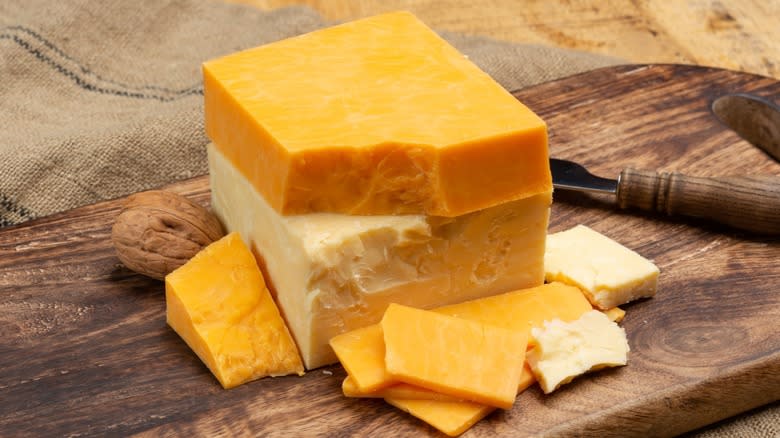The Common Storage Mistake That's Hurting The Flavor Of Your Cheese

Few things are quite as unsettling as biting into what was once a nice piece of cheese, only to find that it no longer tastes, well, like cheese. The Brie tastes a bit oniony, the Gouda a little citrusy, and the chèvre tastes like last night's leftovers. What happened? You probably made one key mistake: storing your cheese too close to other fragrant foods and ingredients.
Cheese, even if it looks quite solid, is relatively porous, and when you pop it in the fridge without storing it properly, it works like a sponge, soaking up the wafting odors and flavors of its nearby food companions. This is true even of hard cheeses like cheddar and parmesan. That's why it's important not to store cheese alongside fragrant items like onions, garlic, and citrus, or herbs such as rosemary and basil. But that doesn't mean you should keep all your cheese stashed away in a drawer. To keep cheese smelling and tasting fresh, you might want to try some key cheese storage methods, such as wrapping it in wax paper.
Read more: Ingredients To Take Your Scrambled Eggs To The Next Level
Wrap Your Cheese In Wax Paper, Not Plastic

Plenty of folks have a designated cheese drawer that stores their assorted fromage, and that's definitely a step in the right direction. However, sometimes the call is coming from inside the house, meaning some cheeses can pack a pungent punch themselves. Gorgonzola, Stilton, Roquefort, and other stinky cheeses can leach their smell and flavor onto milder ones, so storing them separately is important. You do have to perform a bit of a balancing act, however, as you don't want to completely wrap your cheeses in plastic wrap or foil, either. These don't allow the cheese to breathe and will kill off its necessary bacteria.
Cheese keeps best when it can breathe in a slightly humid environment, so wrapping it in cheese or wax paper is ideal. After loosely wrapping your cheese, you might also want to try putting it in a second protective layer, such as a plastic food container with a hole-punctured lid. A punctured plastic bag can accomplish this task, as well. This will help prolong your cheese's flavor without letting it leak onto other cheeses.
Read the original article on Mashed.


